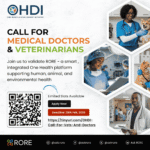ABOUT ICRC
The International Committee of the Red Cross (ICRC) works worldwide to provide protection and humanitarian assistance to people affected by conflict and armed violence. ICRC takes action in response to emergencies and at the same time promotes respect for international humanitarian law. We work closely with National Red Cross and Red Crescent Societies and with their International Federation to ensure a concerted, rational, and rapid humanitarian response to the needs of the victims of armed conflict or any other situation of internal violence.
ROLE DESCRIPTION
The ICRC defines Economic Security as the status of an individual, household, or community that can cover its life and livelihoods obligatory expenditures in a sustainable manner, consistent with its environment, culture, and customs.
The veterinary programs conducted by the ICRC are the following,
- Vaccination campaigns
- Veterinary treatment programs
- De- (re-) stocking
- Fodder production / -banks
- Capacity building
- Herders’ awareness training
- Community Animal Health Workers (CAHWs) training
- Support to existing structures and institutions
MAIN RESPONSIBILITIES
The following are the responsibilities expected to be carried out by the representative veterinarians of ICRC
- You are the focal point for livestock-related food production programs, with direct operational responsibility for the implementation of livestock programs.
- You design and propose appropriate livestock interventions, integrated into the Economic Security programs, as well as conduct the post-intervention monitoring and impact evaluation of the livestock program/projects implemented by the ICRC delegation
- Also, as a representative of the ICRC, you maintain contact and negotiate with government authorities and other parties to the conflict – civilian and military – to carry out the work as effectively as possible.
- You guide and mentor EcoSec team members on livestock issues
DESIRED PROFILE AND SKILLS
- Possess a degree as a Veterinary Surgeon / Doctor
- Good veterinary diagnostic skills
- An advanced degree in Tropical Vet Medicine/Tropical Animal Production/Epidemiology/Sustainable Development/Public Health/ degrees linked to food security or the humanitarian sector is considered an asset
- Minimum 3 years of professional experience in animal health or production
- Strongly motivated by humanitarian work
- Good organizational, managerial, planning, and reporting skills
- Strong capacity to recruit, lead, mentor, and empower a small team of livestock specialists, etc
NOTE: This is a mobile type of position with an Open-Ended contract.
Application deadline is 27 November, 2022.





